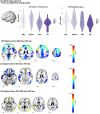Cognitive and brain health in women with early bilateral salpingo-oophorectomy: Implications for risk, resilience, and subjective cognitive decline
- PMID: 40779417
- PMCID: PMC12333622
- DOI: 10.1002/alz.70454
Cognitive and brain health in women with early bilateral salpingo-oophorectomy: Implications for risk, resilience, and subjective cognitive decline
Abstract
Introduction: Early life bilateral salpingo-oophorectomy (BSO) leads to immediate estradiol loss and increased risk of late-life Alzheimer's disease (AD). We investigated risk and resilience (RandR) on the average of 5 years post BSO and their possible impact on subjective cognitive decline (SCD), and brain structure.
Methods: A cohort in Canada (n = 333) included women with and without BSO of whom some reported SCD. We used multiple factor analysis, logistic regression, and magnetic resonance imaging to assess RandR, odds of SCD, and differences in gray matter volume (GMV).
Results: BSO was a risk for worse neuropsychological performance, a 2-fold increase in the odds of SCD, and decreases in GMV in regions sensitive to estradiol, and important for mood, memory, and language. However, estradiol therapy (ETBSO), and verbal IQ mitigated this risk.
Discussion: Risk of SCD exists for younger women with BSO, which affects GMV. Importantly, ETBSO and verbal IQ may shift that risk.
Highlights: Oophorectomy in early middle age may be a risk for subjective cognitive decline. Oophorectomy is associated with less gray matter volume in the prefrontal cortex. Estradiol therapy and verbal IQ might be resilience factors mitigating such risk.
Keywords: early life bilateral salpingo‐oophorectomy; estradiol; estradiol therapy; risk and resilience; subjective cognitive decline; verbal IQ.
© 2025 The Author(s). Alzheimer's & Dementia published by Wiley Periodicals LLC on behalf of Alzheimer's Association.
Conflict of interest statement
The authors have no financial or non‐financial interests to disclose.
Figures


References
MeSH terms
Substances
Grants and funding
- Wilfred and Joyce Posluns Chair in Women's Brain Health and Aging from the Posluns Family Foundation
- WJP-150643/Canadian Institutes of Health Research (CIHR), Ontario Brain Institute and The Centre for Aging+ Brain Health Innovation (CABHI)
- 310336/Canadian Cancer Society
- Jacqueline Ford Gender and Health Fund
- CCNA 049-04/Canadian Consortium on Neurodegeneration in Aging (CCNA) Phase II
LinkOut - more resources
Full Text Sources
Medical

